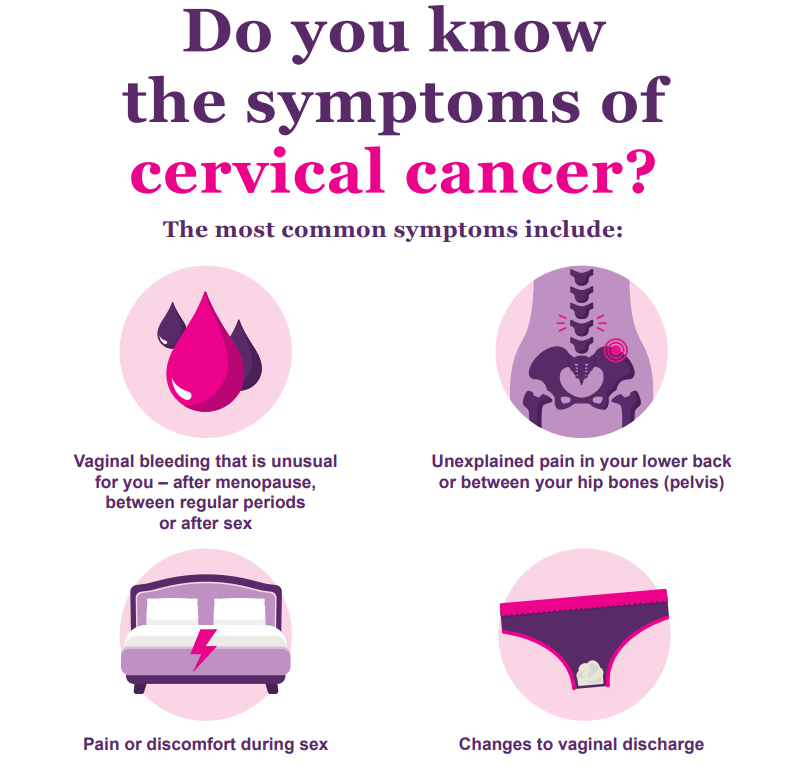
Cervical cancer is a rare disease, and most cases are discovered during a routine Pap test. The doctor will ask about your past health history, Pap test results, and family medical history. He or she will also perform a pelvic exam. The only way to determine whether or not these changes are caused by cancer is to undergo a biopsy. A Pap smear is a test where tiny pieces of tissue are taken from your cervix and tested for precancerous changes.
Cervical cancer symptoms can range from heavy bleeding to pain upon urination. Some women may experience diarrhea and painful urination. Other women may develop swelling in their legs, which may be an early sign of cervical malignancy. While most women are not diagnosed with cervical sarcoma, there are treatments available. A pelvic exam or Pap smear can detect cervical cancer early. During the exam, your doctor will visually examine your cervix and take a biopsy.
The symptoms of cervical cancer include unusual vaginal bleeding, changes in vaginal discharge, or discomfort during sex. Other signs of a potential cancer include pain during sex, or in the lower back or pelvic area. These symptoms may be caused by another ailment, but it’s best to report them to your GP so that the doctors can rule out any other causes. If you’ve ever had any of these symptoms, you should consult your doctor or visit a healthcare professional to get a proper diagnosis.
If you’re a woman who’s been sexually active, you should get a Pap smear to make sure you’re free from cervical cancer. A Pap smear will detect most cervical cancer cases by visually examining your cervix and taking a sample of the cancer to confirm whether or not it’s cancerous. A regular Pap smear will also detect if the tumor has spread.
While cervical cancer does not have any specific symptoms, the following symptoms may be present in the early stages. You may notice a heavy period that lasts longer than normal, a painful urination, and swollen legs. Fortunately, most cervical cancer cases can be detected by a pelvic exam and Pap smears. These tests will allow your doctor to visually inspect the cervix and take a sample of the cancer tissue for biopsy.

A woman with cervical cancer may experience pelvic pain, such as a sharp pain or pressure in the lower abdomen. In some cases, the cancer may also be so advanced that the woman’s cervix must be removed. The patient may also experience swelling in the legs. Usually, these symptoms are harmless and will not require surgery. However, if the cancer is severe, she may need to have a Pap smear.
Besides symptoms, cervical cancer patients may experience various types of symptoms. Those with early-stage cancer can have no symptoms or only mild symptoms. Those with advanced cancer may experience more intense symptoms and more serious complications. This is because the disease can spread to other parts of the body. In the worst case, cervical cancer can spread to the bones, intestines, or lymph nodes. In addition to cervical cancer, there are many other forms of the disease that may be undetectable without a biopsy.
Cervical cancer is often detected by symptoms such as heavy periods that last longer than usual. Some women experience pain with urination, others with bowel movements. Symptoms of cervical cancer may include blood in the urine, sore throat, and pain in the legs. Typically, a woman with cervical cancer will need to have a Pap smear and a pelvic exam to check for it.
Site https://nuffnang.co.th/ states that if the cancer is not limited to the cervix, it can spread to nearby organs or tissues. Depending on the stage, cervical cancer can be locally limited or spread to other organs. If the cancer is localized, it is treated with surgery or chemoradiotherapy. Although rare, treatment options for cervical disease vary. There are several types of treatment, but most patients experience no symptoms. A biopsy may show that the cancer has not spread to other parts of the body.

